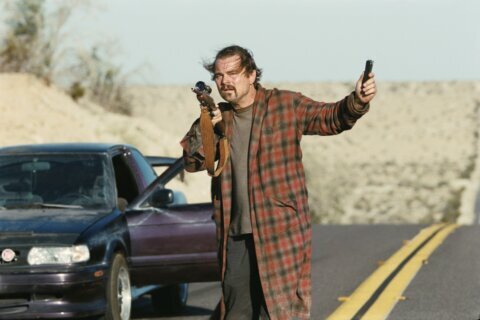WASHINGTON — Broadway is dark tonight. Or, shall we say, Broadway is The Dark Knight.
Twenty-five years after battling Jack Nicholson’s Joker in Tim Burton’s “Batman” (1989), Michael Keaton wears his heart on his superhero sleeve in the daring new movie “Birdman: or (The Unexpected Virtue of Ignorance).”
The role mirrors Keaton’s own career, playing a washed-up Hollywood actor, Riggan Thomas, who’s haunted by his decades-old superhero franchise “Birdman.” Aging and penniless, he refinances his home to direct and star in a Broadway adaptation of Raymond Carver’s “What We Talk About When We Talk About Love.”
His goal is to salvage his artistic credibility, a theme presented in the film’s opening quote:
“And what did you want?”
“To call myself beloved, to feel myself beloved on the earth.”
Riggan’s undertaking is filled with challenges, both during production and behind the scenes.
On stage, he must corral his eccentric stars, from lead actress Lesley (Naomi Watts), who desperately seeks validation, to marquee star Mike (Ed Norton), who routinely shows up drunk or aroused.
Backstage, Riggan clashes with his stoner daughter, Sam (Emma Stone); ex-wife, Sylvia (Amy Ryan); current girlfriend, Laura (Andrea Riseborough); and anxious producer, Jake (Zach Galifianakis).
It’s no coincidence that many of the film’s cast members hail from other Hollywood superhero flicks. In addition to Keaton, “Birdman” stars both the Incredible Hulk (Norton) and Spider-Man’s love interest Gwen Stacy (Stone). Of course, finding stars with superhero ties isn’t hard. Just look at “American Hustle” (2013) — Christian Bale (“The Dark Knight”), Jennifer Lawrence (“X-Men”), Amy Adams (“Man of Steel”), Bradley Cooper (“Guardians of the Galaxy”) and Jeremy Renner (“The Avengers”).
In “Birdman,” Renner is even floated as a possible star for Riggan’s play, only for Galifianakis to remind him he’s busy with the “Avengers” franchise. Woody Harrelson is also suggested, but he’s already committed to a “Hunger Games” sequel. Such is the life of a Hollywood casting director.
Fortunately, “Birdman” casting director Francine Maisler nails it with the supporting cast.
Galifianakis provides comic relief similar to his web series “Between Two Ferns,” only here the two ferns are his “producer” predecessors Gene Wilder and Zero Mostel. Ryan is an inspired pick after TV success in both drama (“The Wire”) and comedy (“The Office”). And while Riseborough takes her role too far with over-the-top glances, Watts reels it in with an authentic vulnerability.
Best of all is Norton, who makes a strong Oscar case for Best Supporting Actor, repulsing us with unforgettable on-stage outbursts and vile backstage pranks, while proving surprisingly tender in his rooftop flirtations with Stone. Their playful “truth or dare” games bring an important empathy to both characters, countering Norton’s diva antics and Stone’s harsh spats with her absent father:
“Face it, Dad. You’re doing this because you’re scared to death, like the rest of us, that you don’t matter,” she tells Keaton. “And you know what? You’re right. You don’t!”
If the father-daughter relationship carries the script, Keaton carries the entire cast on his soon-to-be Oscar-nominated shoulders, which have long been able to handle dark comedy (“Beetlejuice”) and life-or-death drama (“My Life”). His gutsy, raw performance may be cinema’s most self-reflexive and self-deprecating since Mickey Rourke in Darren Aronofsky’s “The Wrestler” (2008), while his split personality between actor and artifice recalls Natalie Portman in Aronofsky’s “Black Swan” (2010).
Keaton’s tormented director earns the right to be mentioned in the same breath as Marcello Mastroianni in Federico Fellini’s “8 1/2” (1963), Roy Scheider in Bob Fosse’s “All That Jazz” (1979) and Philip Seymour Hoffman in Charlie Kaufman’s “Synecdoche, New York” (2008).
Like those master filmmakers before him, Mexican director Alejandro Gonzalez Inarritu has just turned in a career
achievement. He burst onto the scene with “Amores Perros” (2000), which translates roughly to “Love’s a Bitch,” a film that would have won the Oscar for Best Foreign Language Film if it weren’t for Ang Lee’s “Crouching Tiger, Hidden Dragon” (2000). He was later nominated for the Golden Lion at the Venice Film Festival for “21 Grams” (2003), won Best Director at the Cannes Film Festival for “Babel” (2006) and was nominated for Cannes’ coveted Palme d’Or for “Biutiful” (2010).
“Birdman” shows his continued maturation as a filmmaker. Rather than the quick-cutting Tarantino-style violence
of “Amores Perros,” or the parallel action of interweaving story lines in “Babel,” Inarritu offers a dazzling display of choreography between actor and camera in “Birdman.”
His best move was to recruit Oscar-winning cinematographer Emmanuel Lubezki, who opened “Gravity” (2013) with a 20-minute single take in outer space. The technique paid off with a Best Director statue for Alfonso Cuaron, and it could garner similar attention for Inarritu here.
From the opening image of Keaton meditating in mid-air, to the final shot of Stone, “Birdman” unfolds with the illusion of one continuous shot — the entire movie! The camera weaves from backstage to on stage, the catwalk to the rooftop, the streets of Times Square to the dive bars of Broadway.
In reality, the film is made up of a number of long takes spliced together with invisible transitions, tilting up to the sky for time-lapse photography, moving through the shadows of a dark hallway, or pushing in on an iPhone screen that becomes a bar television.
There are plenty of moments where you will scratch your head and say, “How did they do that?” Several times, the camera watches characters in front of a dressing-room mirror, but the cameraman is not seen in the reflection. Later, as two characters make out on the catwalk, the camera swoops down to the stage, only to find those same characters already down on stage. This fake-out blocking is similar to Michel Gondry’s “Eternal Sunshine of the Spotless Mind” (2004), where Jim Carrey and Kate Winslet disappear and reappear on screen with jaw-dropping surprise.
These fake-outs also apply to the soundtrack, presenting what appears to be non-diegetic sound (emanating from the film’s soundtrack), only to reveal it to be diegetic (emanating from an on-screen source, like a street musician). Music composer Antonio Sanchez embraces the unique challenge of blending George Benson and Danny Elfman, while rhythmic drumming cues each letter of the opening credits, one-upping this year’s Sundance winner “Whiplash.”
Look also for some impressive mise-en-scène — symbolic placement of images within the frame. As Keaton nostalgically remembers his superhero days, you’ll notice a Superman billboard in the background. As Stone and Norton flirt on a rooftop between the St. James and Majestic theaters, you’ll notice a billboard for “Phantom of the Opera,” foreshadowing a symbolic mask at the end of the film. Such tangible images are never far from the surreal, with Inarritu slipping from reality to fantasy as Keaton is stalked by the ghost of his own winged superhero, urging a Hollywood comeback.
This orchestration of sight and sound makes “Birdman” a constantly engaging cinematic experience. Active viewers will have a field-day tracking the cinesthetic techniques, just as movie buffs will enjoy references to James Mason’s suicidal sea walk in “A Star is Born” (1954). The combination was enough for a Golden Lion nomination at this year’s Venice Film Festival.
At the same time, the movie works just as well for passive viewers, so long as you can stomach a few vulgar jokes. Unlike many art-house darlings, “Birdman” doesn’t take itself too seriously. The most honest scene comes as Keaton confronts a stuffy theater critic — a la Addison DeWitt in “All About Eve” (1950) — who plans to slam his play before she even sees it. Keaton critiques the critic, saying her reviews mention nothing about technique, structure or intention, instead rattling off fancy words and snarky opinions that ignore the hard work of each show’s creator.
Thus, “Birdman” is a glorious equal-opportunity offender, scoring points with highbrow cinephiles by spoofing mindless CGI action, then scoring points with lowbrow moviegoers by mocking critics who trash the mainstream. If you really want to change Hollywood’s direction, don’t talk down to “we the people” from your high horse. Convince moviegoers there’s a better way to fly.
“Birdman” does exactly this, mocking Hollywood’s obsession with superhero sequels, but doing so in a way that is never pretentious, often hilarious and achingly human. These gutsy filmmakers find a refreshing sweet spot between artistic wizardry and commercial appeal, moving forward the art of filmmaking, while being wildly entertaining.
If “All About Eve” had the guts to mock Broadway, and “Sunset Boulevard” had the guts to mock Hollywood, “Birdman” has the cojones to mock both — at the same time — and sticks the landing.
Fasten your seatbelts, Broadway, and get ready for your closeup, Hollywood.
As they say in Gotham, it’s always darkest just before the dawn.
We may have just seen the dawn.
★ ★ ★ ★
The above rating is based on a 4-star scale. See where this film ranks in Jason’s Fraley Film Guide. Follow WTOP Film Critic Jason Fraley on Twitter @JFrayWTOP, read his blog The Film Spectrum, listen Friday mornings on 103.5 FM and see a full list of his stories on our “Fraley on Film” page.








